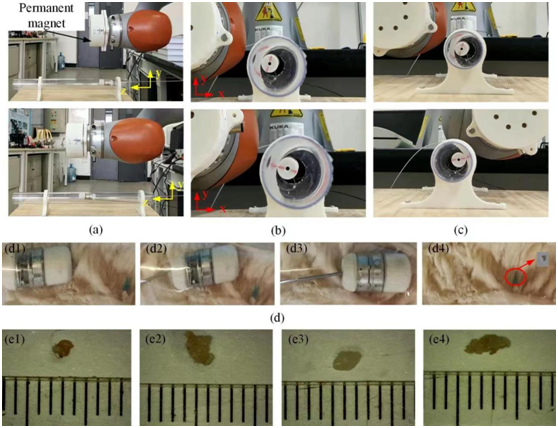【China Daily】Chinese scientists develop novel biopsy capsule robot to replace colonoscopy
exploringtianjin.com

Movement performance test of the new biopsy capsule robot developed at Tianjin University and biopsy samplings
Chinese scientists have developed the capsule robot (CR) — a new strategy for biopsy sampling that is expected to replace colonoscopy.
The team of researchers, led by Song Zhibin from Tianjin University, has developed a novel biopsy sampling strategy using the CR. The robot they have developed can cut suspicious diseased tissue in the colon at a high speed, avoiding the tissue tearing that occurs in existing biopsy methods. The results have been published in Cyborg and Bionic Systems, a high-level journal of the China Science and Technology Journal Excellence Action Plan.
Among humans, colorectal cancer is a fatal digestive tract disease. Colonoscopies allow doctors to visually inspect the lesions in the colorectum and retrieve a biopsy to confirm pathological diagnosis, but traditional colonoscopies may cause discomfort to patients. The new capsule endoscopy, on the other hand, is a promising method since it can eliminate some of those issues.
"Capsule endoscopy is also called ‘capsule robot’. Making use of CRs to inspect the stomach, esophagus and other areas can not only provide visual information, but also perform biopsy operations. It is part of the main development direction of digestive tract disease screening in the future," Said Song Zhibin, Associate Professor from the School of Mechanical Engineering of Tianjin University.
The research presents a new strategy for biopsy sampling by “proposing a high-speed rotating blade for the biopsy capsule robot (BCR)”, and embedding a small magnet in CRs equipped with the blade to control its movement via an external magnetic field.”
The blade is triggered by a tightened spring that could provide more instantaneous power than a motor or a magnet of an identical mass, while effectively avoiding interference between motion control and biopsy manipulation. At the same time, the team also designed the trigger mechanism to guarantee reliable sampling.
According to the verification results of vitro porcine large intestine biopsy sampling, the novel BCR can achieve multiple biopsy triggers and effectively avoid the tearing of soft tissue when its cutting speed reaches a certain value, and is expected to become a promising method of clinical gastrointestinal examination.
“The results of this research can realize the function of multiple biopsies in one examination, and provide technical support for the clinical application of CRs with biopsy functions in the future,” Song said, adding that "It will further improve the performance of diagnosis and the treatment of gastrointestinal diseases, and will also be the future direction of capsule robots.”
For more information, please click: http://education.chinadaily.com.cn/2022-09/29/c_816968.htm





